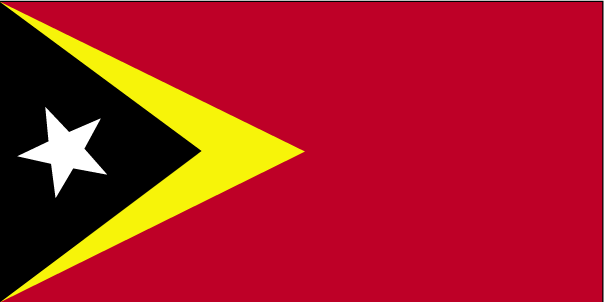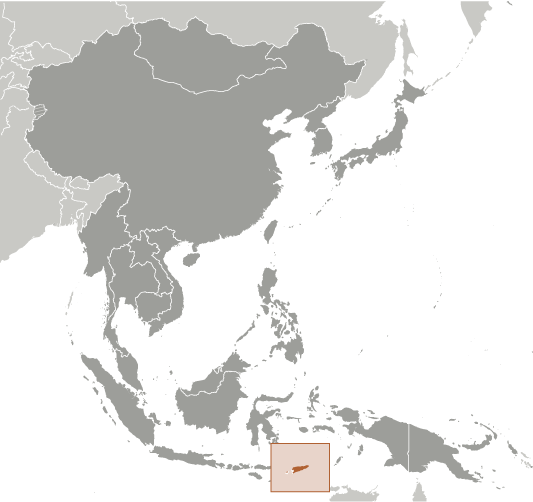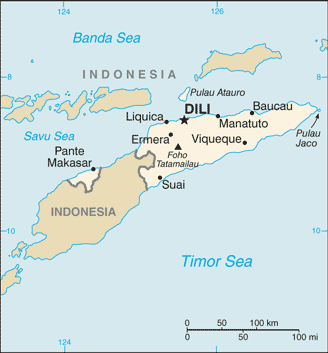The Portuguese began to trade with the island of Timor in the early 16th century and colonized it in mid-century. Skirmishing with the Dutch in the region eventually resulted in an 1859 treaty in which Portugal ceded the western portion of the island. Imperial Japan occupied Portuguese Timor from 1942 to 1945, but Portugal resumed colonial authority after the Japanese defeat in World War II. East Timor declared itself independent from Portugal on 28 November 1975 and was invaded and occupied by Indonesian forces nine days later. It was incorporated into Indonesia in July 1976 as the province of Timor Timur (East Timor). An unsuccessful campaign of pacification followed over the next two decades, during which an estimated 100,000 to 250,000 individuals lost their lives. On 30 August 1999, in a UN-supervised popular referendum, an overwhelming majority of the people of Timor-Leste voted for independence from Indonesia. Between the referendum and the arrival of a multinational peacekeeping force in late September 1999, anti-independence Timorese militias - organized and supported by the Indonesian military - commenced a large-scale, scorched-earth campaign of retribution. The militias killed approximately 1,400 Timorese and forcibly pushed 300,000 people into western Timor as refugees. The majority of the country's infrastructure, including homes, irrigation systems, water supply systems, and schools, and nearly 100% of the country's electrical grid were destroyed. On 20 September 1999, the Australian-led peacekeeping troops of the International Force for East Timor (INTERFET) deployed to the country and brought the violence to an end. On 20 May 2002, Timor-Leste was internationally recognized as an independent state. In late April 2006, internal tensions threatened the new nation's security when a military strike led to violence and a near breakdown of law and order. At Dili's request, an Australian-led International Stabilization Force (ISF) deployed to Timor-Leste in late May. In August, the UN Security Council established the UN Integrated Mission in Timor-Leste (UNMIT), which included an authorized police presence of over 1,600 personnel. The ISF and UNMIT restored stability, allowing for presidential and parliamentary elections in April and June 2007 in a largely peaceful atmosphere. In February 2008, a rebel group staged an unsuccessful attack against the president and prime minister. The ringleader was killed in the attack and the majority of the rebels surrendered in April 2008. Since the unsuccessful attacks the government has enjoyed one of its longest periods of post-independence stability.
Population
1,154,625
Country comparison to the world:156
note: other estimates range as low as 800,000 (July 2010 est.)
Nationality
Noun:Timorese
Adjective:Timorese
Ethnic groups
Austronesian (Malayo-Polynesian), Papuan, small Chinese minority
Religions
Roman Catholic 98%, Muslim 1%, Protestant 1% (2005)
Languages
Tetum (official), Portuguese (official), Indonesian, English
note: there are about 16 indigenous languages; Tetum, Galole, Mambae, and Kemak are spoken by significant numbers of people
Country Name
Conventional long form:Democratic Republic of Timor-Leste (pronounced TEE-mor LESS-tay)
Conventional short form:Timor-Leste
Local long form:Republika Demokratika Timor Lorosa'e [Tetum]; Republica Democratica de Timor-Leste [Portuguese]
Local short form:Timor Lorosa'e [Tetum]; Timor-Leste [Portuguese]
Former:East Timor, Portuguese Timor
Government Type
republic
Capital
Name:Dili
Geographic coordinates:8 35 S, 125 36 E
Time difference:UTC+9 (14 hours ahead of Washington, DC during Standard Time)
Administrative divisions
13 administrative districts; Aileu, Ainaro, Baucau, Bobonaro (Maliana), Cova-Lima (Suai), Dili, Ermera (Gleno), Lautem (Los Palos), Liquica, Manatuto, Manufahi (Same), Oecussi (Ambeno), Viqueque
note: administrative divisions have the same names as their administrative centers (exceptions have the administrative center name following in parentheses)
Independence
28 November 1975 (independence proclaimed from Portugal); note - 20 May 2002 is the official date of international recognition of Timor-Leste's independence from Indonesia
National Holiday
Independence Day, 28 November (1975)
Constitution
22 March 2002 (based on the Portuguese model)
Legal system
On 29 March 2009 the president promulgated the Timor-Leste penal code; UN-drafted legal system based on Indonesian law remains in place for civil codes but is to be replaced by civil codes based on Portuguese law; these have passed but have not been promulgated; has not accepted compulsory ICJ jurisdiction
Suffrage
17 years of age; universal
Executive branch
Chief of state:President Jose RAMOS-HORTA (since 20 May 2007); note - the president plays a largely symbolic role but is able to veto legislation, dissolve parliament, and call national elections
Head of government:Prime Minister Kay Rala Xanana GUSMAO (since 8 August 2007), note - he formerly used the name Jose Alexandre GUSMAO; Vice Prime Minister Mario Viegas CARRASCALAO (since 5 March 2009); Vice Prime Minister Jose Luis GUTERRES (since 8 August 2007)
Cabinet:Council of Ministers
(For more information visit the World Leaders website)
Elections:president elected by popular vote for a five-year term (eligible for a second term); election last held on 9 April 2007 with run-off on 8 May 2007 (next to be held in May 2012); following elections, president appoints leader of majority party or majority coalition as prime minister
Election results:Jose RAMOS-HORTA elected president; percent of vote - Jose RAMOS-HORTA 69.2%, Francisco GUTTERES 30.8%
Legislative branch
unicameral National Parliament (number of seats can vary from 52 to 65; members elected by popular vote to serve five-year terms)
Elections:last held on 30 June 2007 (next elections due by June 2012)
Election results:percent of vote by party - FRETILIN 29%, CNRT 24.1%, ASDT-PSD 15.8%, PD 11.3%, PUN 4.5%, KOTA-PPT (Democratic Alliance) 3.2%, UNDERTIM 3.2%, others 8.9%; seats by party - FRETILIN 21, CNRT 18, ASDT-PSD 11, PD 8, PUN 3, KOTA-PPT 2, UNDERTIM 2
Judicial branch
Supreme Court of Justice - constitution calls for one judge to be appointed by National Parliament and rest appointed by Superior Council for Judiciary; note - until Supreme Court is established, Court of Appeals is highest court
Political Parties and Leaders
Democratic Party or PD [Fernando de ARAUJO]; National Congress for Timorese Reconstruction or CNRT [Xanana GUSMAO]; National Democratic Union of Timorese Resistance or UNDERTIM [Cornelio DA Conceicao GAMA]; National Unity Party or PUN [Fernanda BORGES]; People's Party of Timor or PPT [Jacob XAVIER]; Revolutionary Front of Independent Timor-Leste or FRETILIN [Mari ALKATIRI]; Social Democratic Association of Timor or ASDT [Francisco Xavier do AMARAL]; Social Democratic Party or PSD [Zacarias Albano da COSTA]; Sons of the Mountain Warriors or KOTA [Manuel TILMAN] (also known as Association of Timorese Heroes)
Political pressure groups and leaders
NA
International organization participation
ACP, ADB, AOSIS, ARF, ASEAN (observer), CPLP, FAO, G-77, IBRD, ICAO, ICCt, IDA, IFAD, IFC, IFRCS, ILO, IMF, IMO, Interpol, IOC, IPU, MIGA, NAM, OPCW, PIF (observer), UN, UNCTAD, UNESCO, UNIDO, Union Latina, UNWTO, UPU, WCO, WFTU, WHO
Diplomatic representation in the US
Chief of mission: Ambassador Constancio da Conceicao PINTO
Chancery: 4201 Connecticut Avenue NW, Suite 504,Washington, DC 20008
Telephone:[1] (202) 966-3202
FAX:[1] (202) 966-3205
Diplomatic representation from the US
Chief of mission:Ambassador Hans G. KLEMM
Embassy:Avenida de Portugal, Praia dos Conqueiros, Dili
Mailing address: US Department of State, 8250 Dili Place, Washington, DC 20521-8250
Telephone: (670) 332-4684
FAX:(670) 331-3206
Flag description
red, with a black isosceles triangle (based on the hoist side) superimposed on a slightly longer yellow arrowhead that extends to the center of the flag; a white star is in the center of the black triangle










